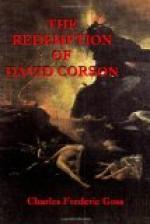It was evident to every one who met him that he was moving aimlessly. Now and then some keen-eyed pedestrian stopped to take a second look and, turning to do so, felt an instinctive pity for this burdened, care-encumbered man, wending his way through the almost deserted streets.
This gaze was unreturned and this sympathy unperceived. He was in one of those fits of abstraction when the whole external universe with all its beauties and sublimities has ceased to exist. His cup of misery was full, he had lost all clue to the meaning of life and a single definite idea had taken complete possession of his mind. It was that he was doomed to pass his existence under a curse.
By the very nature of its being, the soul is keenly sensitive to blessings and curses, and it is not alone the benediction of the mitred priest that thrills the heart! That of the pauper upon whom we have bestowed alms sometimes awakens in our bosom a hope and gladness out of all proportion to the insignificant source from which it has proceeded. Nor do we need to be cursed by the great and the powerful to feel a pang of terror in our souls! Let but some helpless wretch whom we have wronged commit his cause to heaven in a single syllable, and we shudder as if we already heard the approach of those avenging feet which the ancients said were shod with wool. The curse of the dead and impotent beggar rang in the ears of the fugitive like the strokes of an alarm bell. That deep sense of justice which had been formed in his early life had been revivified and endowed with a resistless power.
At such moments as these through which he was passing man experiences no doubt as to the nature and origin of conscience. He is as sure that the terror aroused in his heart is the echo of the decision of some real and awful tribunal as that the wave upon the shore is produced by some real though invisible storm at sea, or the shadow on the mountain by some palpable object between it and the sun.
The conscience is not only “a secretion in the brain,” it is not only the “accumulated observations of the universal man upon the phenomena of the moral life,” it is not only his study of the laws of cause and effect distilled into maxims and forebodings; it is this, but it is more than this—as every total is more than any of its parts. For every man has something which is in him, but not of him. It resides within his intelligence, but it is not so much the offspring of his intelligence as an emissary that has taken up its residence there! This obscure something is stronger than he. He does not subordinate it to himself, but is subordinated by it. He can rebel against it, but he cannot overthrow it. He can fly from it, but he cannot escape it.
This sublime and mysterious power had at last obtained complete ascendency in the soul of David Corson. He no longer argued and he no longer resisted. He saw no way of escape from the spiritual anaconda which was tightening its folds around him.




